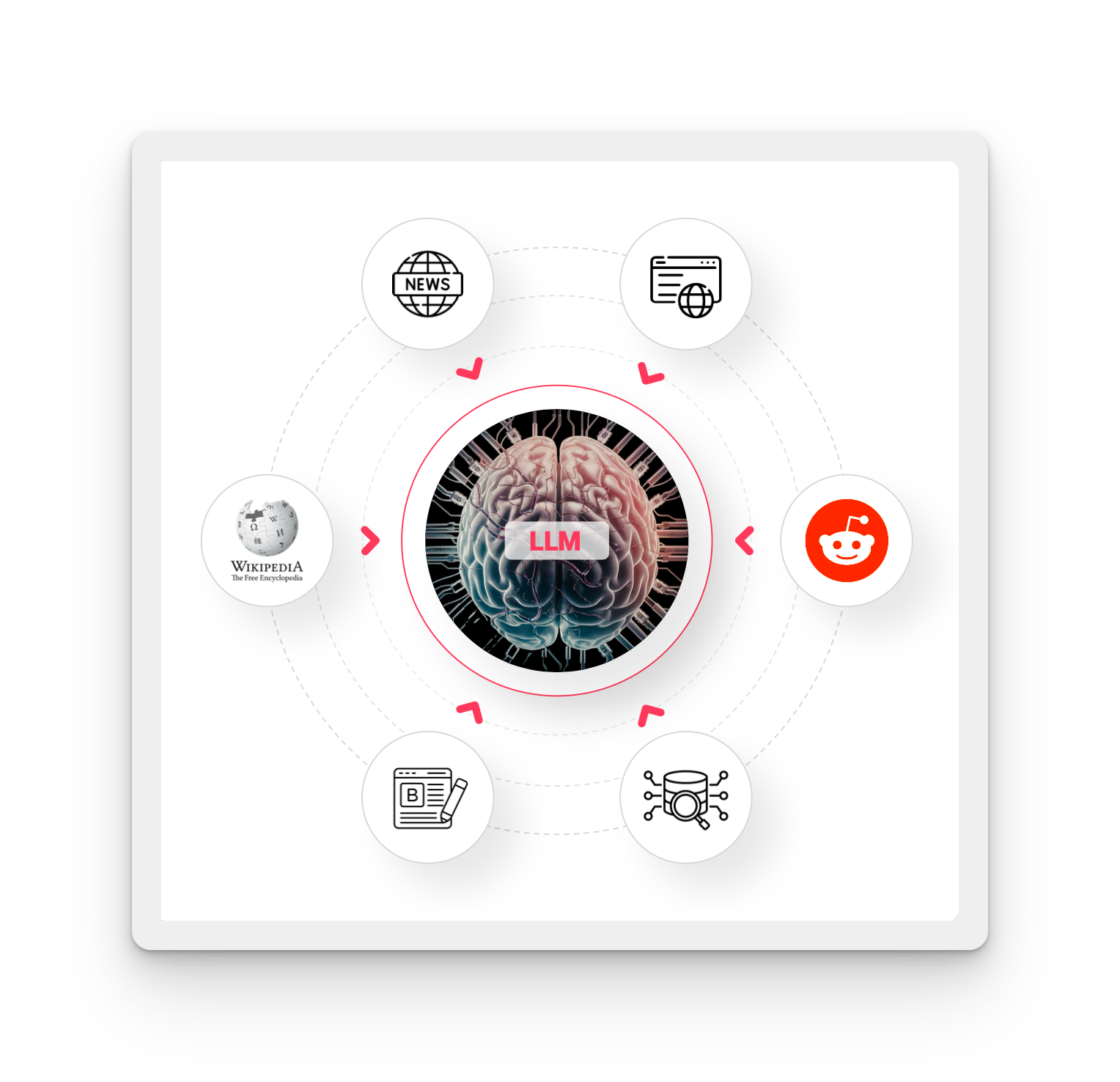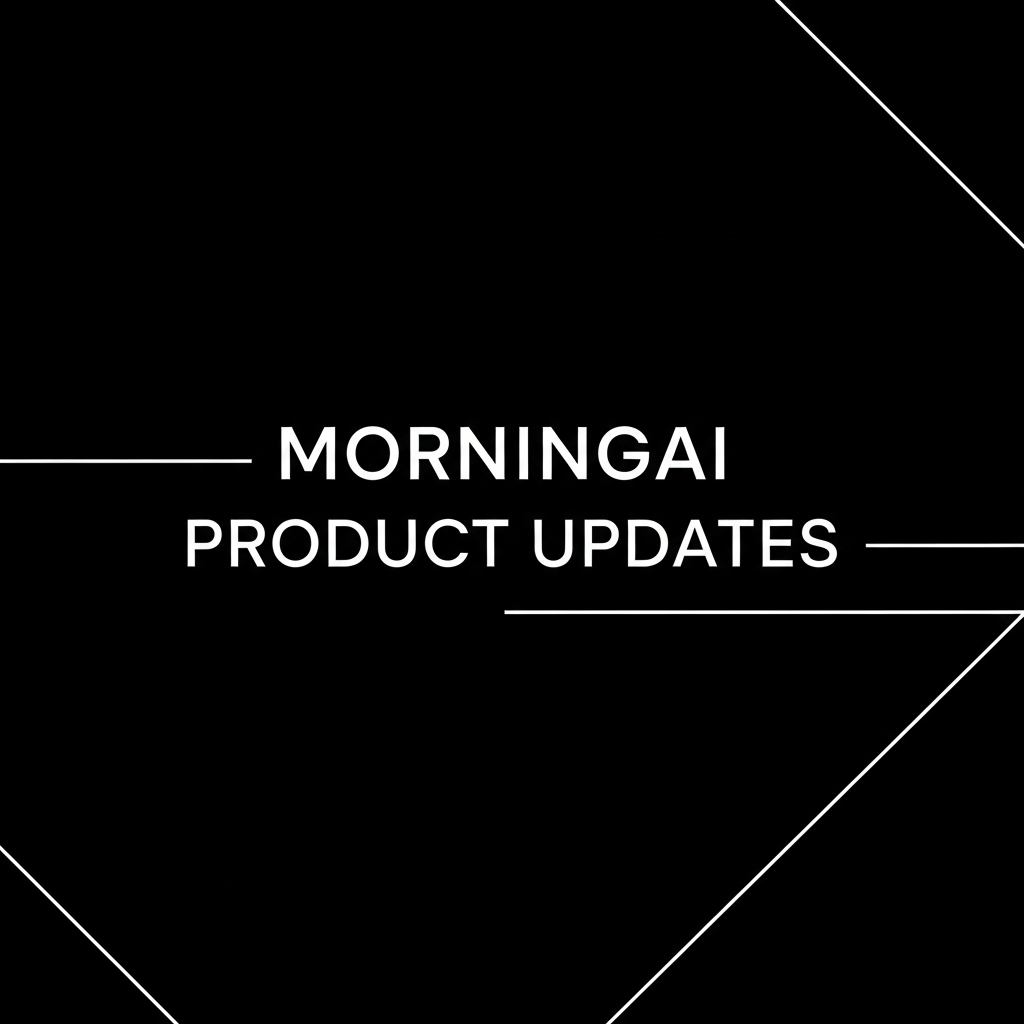
Your Content is Invisible to AI (Here's the 20-Minute Fix)

Your Content is Invisible to AI (Here's the 20-Minute Fix)
SEO got you to page one. AEO gets you into the answer.
Remember when ranking on page one of Google felt like winning the lottery? Those days are fading fast.
We've noticed it in our own behavior at MorningAI: we're using Google significantly less than we did 12 months ago. We're getting the answers we need right inside chatbots.
We're not alone. ChatGPT, Claude, and Perplexity are replacing traditional search for millions of users. They're not clicking through ten blue links anymore. They're getting direct answers.
And if your content isn't structured for AI to understand and cite? You're invisible.
The good news: most brands haven't figured this out yet. You have a window.
The Real Impact (In Numbers)
Traditional SEO typically drives 10-20% of total site traffic for most businesses. That's significant. Lose it, and you've got a problem.
But here's the twist: when someone finally lands on your site after using AI, they're not browsing. They've already researched pricing, compared features, and read reviews through AI. They're ready to buy.
Think about it this way: if you had 1,000 visitors a month before, two years from now you might only get 200. That's an 80% drop-off. But your conversion rate should be significantly higher because they're coming already well-informed.
Less traffic. Better traffic. Higher conversions.
But only if AI systems can find your content first.
What AI Systems Actually Scan
AI platforms look at everything about your brand:
Your owned channels (what you control):
- Website content and structure
- Blog posts and landing pages
- Social media profiles
- YouTube and TikTok content
Third-party sources (what you influence):
- Directory listings
- Media coverage and press mentions
- Industry publication articles
- Community discussions (Reddit, Quora, forums)
Here's the catch: the rules change constantly.
We recently saw this play out with Reddit. For weeks, OpenAI heavily cited Reddit sources. Businesses started hiring Reddit influencers to authentically discuss their brands in communities. Then overnight, OpenAI changed its algorithm. Reddit citations dropped dramatically.
Google took decades to build predictable ranking systems. AI platforms are moving fast and changing often. You can't buy your way to the top yet. You can't even track your "ranking" with precision.
But you can structure your content so AI systems understand it, trust it, and cite it.
5 Tactics That Work Right Now
1. Lead With Direct Answers (Stop Burying Your Point)
The Problem: Most content buries the answer under paragraphs of context.
The Fix: Put your key takeaway in the first sentence.
Example:
Bad: "Kombucha has been enjoyed for centuries across many cultures. The fermentation process creates unique flavors. So what exactly is kombucha?"
Good: "Kombucha is a fermented tea beverage made by adding a SCOBY culture to sweetened tea. The fermentation process takes 7-14 days and creates..."
AI systems scan for immediate answers. Give them what they want in your opening line, then expand with details.
Action Step:
- Pick your most important landing page
- Rewrite the first paragraph to answer the main question in sentence one
- Add an FAQ section with 5-10 common questions
- Answer each question in 1-2 sentences before elaborating
Time required: 20 minutes per page
2. Add FAQ Schema to Every Key Page
The Problem: AI crawlers can scan your text, but they comprehend it better with structured data.
The Fix: Implement FAQ schema markup on product pages, service pages, and blog posts.
Schema tells AI systems "this is a question, this is the answer, this is how they relate."
How to do it:
- Go to your highest-traffic page
- Identify 5-10 questions people ask about that topic
- Use Google's FAQ schema generator (free tool)
- Add the schema code to your page
- Validate it with Schema.org validator
One of the most impactful changes we've made at MorningAI is adding comprehensive FAQ sections to our key pages. AI systems love the question-response format. When every blog post and product page includes an FAQ, it dramatically improves how AI understands and cites your content.
Action Step:
- Choose one high-value page
- Add FAQ schema this week
- Validate with Google's Rich Results Test
Time required: 30 minutes per page
3. Refresh Your Top 10 Pages This Quarter
The Problem: Stale content signals to AI that your information might be outdated.
The Fix: Update your best-performing content every 90 days.
Neil Patel's research proves this works: optimizing existing pages often delivers better ROI than creating new content.
What to update:
- Statistics and data points (swap 2023 stats for 2025 stats)
- Examples and case studies (add recent ones)
- Product features or pricing (if changed)
- Author bio and credentials (keep current)
- Screenshots or images (if UI has changed)
Action Step:
- Open Google Analytics
- Identify your top 10 pages by traffic
- Schedule one page per week for refresh
- Update data, add new examples, improve FAQ section
- Update the "Last modified" date
Many brands think they just need to crank out new content constantly. Volume does matter. But quality and recency matter too. You can get tremendous value by improving content you've already created rather than always starting from scratch.
Time required: 45-60 minutes per page
4. Add Real Author Bios With Credentials
The Problem: AI-generated content is everywhere. Platforms prioritize content from identifiable humans with verified expertise.
The Fix: Credit individual authors (not "Editorial Team") and explain their credentials.
This is something we learned the hard way at MorningAI. We used to credit our "editorial team" when multiple people contributed to an article. It seemed diplomatic. But it was hurting our visibility. AI systems give more weight to content from identified, credible individuals because they need to distinguish human expertise from AI-generated fluff.
What to include in author bios:
- Full name and title
- Relevant credentials or certifications
- Years of experience in the field
- Link to LinkedIn or professional profile
- Photo (optional but helpful)
Example: "Written by Sarah Chen, Senior Product Marketing Manager at [Company]. Sarah has 8 years of experience in B2B SaaS marketing and holds a certification in Digital Marketing Strategy from Cornell University."
Action Step:
- Create author bios for your top 3 content contributors
- Add them to all existing blog posts
- Make author attribution mandatory for new content
Time required: 2 hours total setup
5. Cite Credible External Sources
The Problem: Unsupported claims reduce credibility with AI systems.
The Fix: Link to authoritative sources (.edu, .gov, recognized industry publications) and cite current data.
What to cite:
- Statistics and research findings
- Industry reports
- Government data
- University studies
- Established trade publications
How to cite:
- Include author names when available
- Add publication dates
- Use inline links to original sources
- Update or remove outdated citations annually
Action Step:
- Audit one high-value page
- Identify claims that need supporting data
- Find credible sources for each claim
- Add inline links with proper attribution
Time required: 30 minutes per page
Tools That Actually Help
AnswerThePublic ($99/month)
- Shows what questions people ask about your keywords
- Covers Google, Amazon, TikTok, YouTube
- Owned by Neil Patel, continuously updated
Profound ($99/month)
- Built specifically for AEO tracking
- Shows visibility scores in AI responses
- Tracks performance over time
- Publishes educational content about AEO
Google Search Console (Free)
- Identifies emerging queries
- Shows which pages need refreshing
- Still valuable even as behavior shifts to AI
Schema.org Validator (Free)
- Validates your structured data
- Catches errors before they hurt visibility
Note: MorningAI has no financial relationships with these tools.
The Tracking Problem (And Why You Shouldn't Wait)
Here's the uncomfortable truth: you can't track AEO the way you tracked SEO.
AI responses are personalized. What one user sees differs from what another sees. The AI knows conversation history, location, role. Every response is tailored.
Most brands are currently blind about how they appear in AI responses. Google's ranking infrastructure took decades. AI platforms don't have that yet. You can't buy ads. You can't see precisely where you rank.
What to do instead:
- Use Google Search performance as a proxy
- Focus on fundamentals (structure, freshness, credibility)
- Track indirect signals (branded search volume, direct traffic)
- Monitor support tickets for new question patterns
The measurement will improve. The platforms will mature. But brands that wait for perfect tracking will lose to brands that adapt now.
Your 20-Minute Action Plan
Don't try to fix everything today. Start with one page.
This week:
- Pick your highest-traffic page
- Rewrite the opening to answer the main question in sentence one
- Add a 5-question FAQ section
- Implement FAQ schema markup
- Validate with Schema.org tool
Next week:
- Add author bio with credentials
- Update any statistics older than 12 months
- Add 2-3 citations to credible external sources
- Check that subheadings are clear and scannable
This quarter:
- Repeat for your top 10 pages
- Make FAQ sections and author bios mandatory for all new content
- Schedule quarterly content refreshes
Time investment: 20 minutes now, 2 hours this week, ongoing maintenance
Wake Up to AI-Ready Content
The shift from traditional search to AI-powered answers is already happening. Your competitors are still hitting the snooze button on this one.
Start with one page this week. Get that content fresh and structured. Then build the habit. Before you know it, AI visibility becomes as natural as your morning coffee.
Want help creating content that's AI-ready from the start? MorningAI is built for exactly this. But whether you use our platform or go it alone, start adapting now.
Your competitors are still figuring out where they left their SEO playbook. You have a window to get ahead while they're still half-awake.
Start today. Before the early birds beat you to it.

Start your free 14 days trial!
easily collaborate with your agency partners and freelancers.








